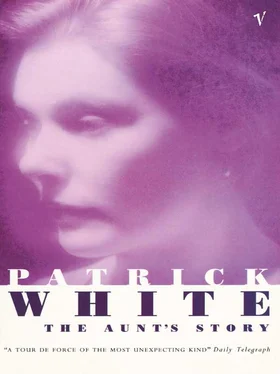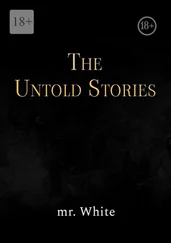Disgust knotted her hands.
‘All right. It was no choice of mine,’ Wetherby said. ‘None of it.’
As if he had noticed the twitching of her dark moustache.
Alone, Theodora listened to the morning pass. She walked in the garden. She would have chosen an acacia, of which the green shade covers with superior benevolence, but the garden did not cater for emotional states, least of all desperation. The garden encouraged exposure, and then contained it, with all the indifference of zinc.
There were greater commotions too. There was the commotion of the electric current. Miss Grigg stood in the hall. She held the electric iron. She held it for Monsieur Durand to see, as if it might explain something of which exasperation was incapable. Miss Grigg said that in no hotel of any standing, in no hotel in which she had ever stayed, had the electric current been cut off quite so frequently. Miss Goodman would bear her out, that such things did not happen in hotels. It was not possible for ladies to press their slips.
Monsieur Durand looked sadly at Miss Grigg’s iron, which did not after all explain, any more than words.
‘It is the municipal power,’ said Monsieur Durand, ‘that does not for the moment circulate, but which will circulate again.’
In the lounge, under the pink lampshade, a hand was practising a gavotte, each note white and separate that it picked up.
Do you know, Miss Grigg, Theodora wanted to say, the music has not begun yet?
But it was not possible, just as it is not possible to convince certain faces that a murder is being done in the next room.
So instead she said, ‘Yes, Miss Grigg. It is just as Monsieur Durand says. He is not the municipal power. And the current will circulate again.’
So that Miss Grigg was cut. She was left holding her inarticulate iron. Her face was flat and functionless.
‘But all the same, one expects,’ she said, ‘to find what the prospectus puts in words. In the best ’otels. In the ’Otel Excelsior, at Chamonix, they even ’ad an electric device for pushin’ the snow off the window sills.’
Theodora listened to the hand, round the corner in the lounge, pick up each white, separate note of the gavotte. Each note trembled tentatively, fell, was gathered again, to glisten. The music flowed into a surer music, whiter and lighter.
‘Katina,’ called Miss Grigg. ‘You remember the ’Otel Excelsior? And the little trouts? Trouts with their tails in their mouths.’
‘No, Grigg, it was the Hôtel des Alpes,’ said Katina Pavlou round the corner in the lounge.
The voice blurred, as the music doubled on its underwater self, with the glistening surety of snow water, a bluish white, joyful and perpetual as mountain water. Katina Pavlou lifted her hands and the music fell, sure, and pure, and painfully transparent. So that any possible disaster of age or experience must drown in music. Disasters, the music implied, are reserved for observers, the drowning drown. Caught in this iciness of music, Theodora felt the breath stop in her throat. She went inside the little wintergarden and closed the door.
‘It is difficult to escape from music. Music pursues.’
It was General Sokolnikov, of course, who sat beneath a palm. In the steamy atmosphere of the little wintergarden the palm relaxed in rubber strips, as the General ponderously licked a postage stamp.
‘You must realize, Ludmilla, that you cannot close doors.’
It was true. Even in the little wintergarden music sluiced leaf and frond. It trembled in distinct drops on the pots of maidenhair.
‘ You must realize, General,’ said Theodora, ‘that something has happened, or will.’
She held her front, afraid that her dress might not ultimately contain her agitation.
‘As if I didn’t,’ said Sokolnikov. ‘The municipal authorities have cut the municipal current. It is a habit that they have.’
Then it is not possible, Theodora knew, it is not possible to tell.
And now the General was engaged in the act of extraction. He was easing the stamp from his tongue.
‘I was writing to my ex-wife, Edith,’ he said.
Not without some distaste for his tongue, some suspicion of fish. Carefully parting the leaves of a begonia, Alyosha Sergei Sokolnikov spat.
‘We have adopted this peculiar convention of two people exchanging letters,’ the General said, past an excess of tongue. ‘We describe our digestions and the weather. In this way we cherish what remains of an unfortunate relationship. In this way it is easier to impose the reality one chooses.’
‘Then, there are many?’ said Theodora.
‘What questions you ask! Though you, of course, are different.’
His voice hesitated to disperse air. He made her thin, though she was, she realized. Her dress stirred only in a wind of music and words.
‘Yes,’ said the General softly. ‘You, Ludmilla, you are an illusion. You died years ago in the forests of Russia.’
She was almost ready to agree.
‘Then, thank you, Alyosha Sergei,’ she said, ‘thank you for accepting this illusion.’
‘Oh, illusions are necessary. It is necessary to accept. I shall tell you a secret. Incidentally. I was a major once. Also a colonel. Perhaps.’
‘Then you have deceived us, Major ?’ Theodora said.
‘Deceit, Ludmilla, is a wincing word. I was a general in spirit, always. If I was not in fact, it was due to misfortune, and the superior connections of my subordinate officers. But how I have lived, in spirit. Such bugles!’
There was no further note in the Hôtel du Midi. It was quite still. How long this might continue seemed to Theodora to depend on Sokolnikov and the furniture.
‘In time it will be time for lunch,’ he sighed, examining the envelope as if he doubted the address.
‘I do not expect to be here for lunch,’ Theodora said. ‘I am going out. I am going to put on my hat.’
‘Why?’ asked Sokolnikov, ‘why put on your hat if your haste is so indecent?’
‘Alyosha Sergei,’ Theodora said, ‘you do not know.’
So that the windows quivered, and a grey cloud, blowing out of Corsica.
‘Oh, but I do,’ said Alyosha Sergei.
He sat in a deflated heap.
‘They have taken the coast road,’ he said. ‘They are walking towards the tower which has some connection with Napoleon. He has taken her hand because she expects him to. And although his hand is dead, she is moved, because the music is still moving in her own. It does not much matter whether it is he. Because she has chosen. She has chosen this as the moment of experience. And experience has a glaze. It has not yet cracked ,’ the General almost shouted.
Theodora Goodman began to circumnavigate the furniture.
‘At least my feet can move,’ Theodora said.
‘Yes,’ said Sokolnikov. ‘And I do not wish to deter you. You can also create the illusion of other people, but once created, they choose their own realities.’
All that afternoon Theodora Goodman, walking hatless between houses, past trees, near the fragments of stone walls from which lizards looked, heard the words of Sokolnikov. Like rubber they departed and returned. Now her motives were equally elastic, because Sokolnikov had made her doubt. So she could not take the direct road. Roads did not lead through the infinite landscape in which she hesitated, least of all the obvious red coast road. As the town thinned out into advertisements and tins, she wandered higher, where the needle turrets of signorial villas were strangled by roses, and the night club still wore its daylight tarnish. She walked on the edge of the lavender hills.
Here the air had begun to rub. Mist strayed along the skin, dissolved the substance of rock and tree, and confused the intentions still further. Many little anxious paths dispersed through the stiff heather. Goats sprang, scattering their dung. If I were to cross this ridge, she said, suddenly abrupt with purpose in the afternoon, I shall see the stone tower, if this also has not dispersed.
Читать дальше












